Long read: Meet the Ukrainian resistance in London helping the fight against Russia from 1,500 miles away
This article contains affiliate links. We may earn a small commission on items purchased through this article, but that does not affect our editorial judgement.
and live on Freeview channel 276
Sitting at home in his east London flat, Mykhailo Kharkovoi phone constantly pings with new messages.
It’s not friends arranging to meet up in the capital, but Ukrainians on the front-line of the war requesting military supplies and food.
Advertisement
Hide AdAdvertisement
Hide Ad“I get dozens of text messages an hour with guys on the front line telling me what they need in a particular area of Ukraine,” he tells me.
Mykhailo is one of thousands of Ukrainians - who live in London - and are playing their part in the war effort despite living more than 1,000 miles away.
A huge network has sprung up across the capital, and is using Whatsapp and Telegram to arrange vital supplies get delivered to the frontline.
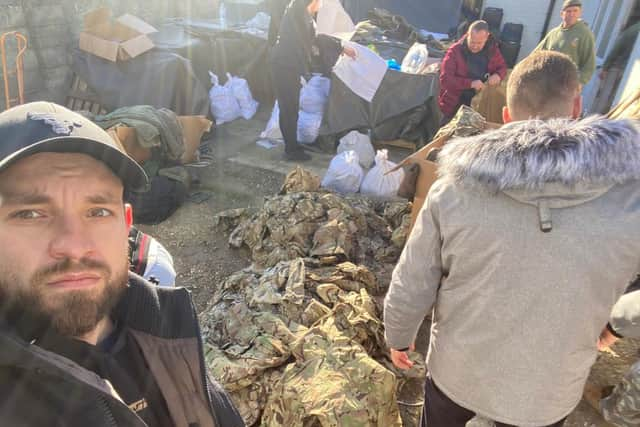

And this has helped Ukrainian troops hold off Russian forces from taking control of key cities including Kyiv, Kharkiv and Odessa.
Advertisement
Hide AdAdvertisement
Hide AdIn his flat in Canary Wharf, Mykhailo orders ballistic helmets, body armour and night vision gear to send to the front line.
The 33-year-old furniture designer took leave from work as soon as the fighting started to help the war effort.
Over the last few weeks the dad-of-one has been driving across the UK to army bases in Folkestone and Cardiff buying military supplies to be sent to a distribution centre in Lviv, western Ukraine.
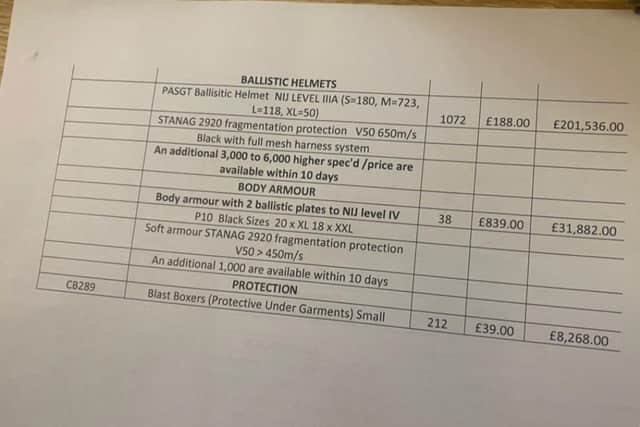

He shows us the list of military supplies the Ukrainian diaspora has paid for and sent to the front-line.
Advertisement
Hide AdAdvertisement
Hide Ad“The guys at the centre then distribute the aid to the areas best where it’s needed,” Mykhailo explains.
“In Kharkiv, you might have enough weapons and helmets but there might not be enough food so they try to arrange the delivery of food to that region.
“In other regions there might be enough food and enough medical supplies but not enough helmets or body armour.
“Our organisation delivers ammunition directly to the front line, in the areas that it is needed.”
Advertisement
Hide AdAdvertisement
Hide AdMykhailo, originally from Zaporizhzhia in south-eastern Ukraine, has been living in London for the last 10 years.
However most of his family are still in Ukraine, including his sister in Kyiv who has been in hiding with her kids, as the city is being bombed.
“It’s a huge problem but hopefully it will end soon and then we can start building Ukraine again,” he said.
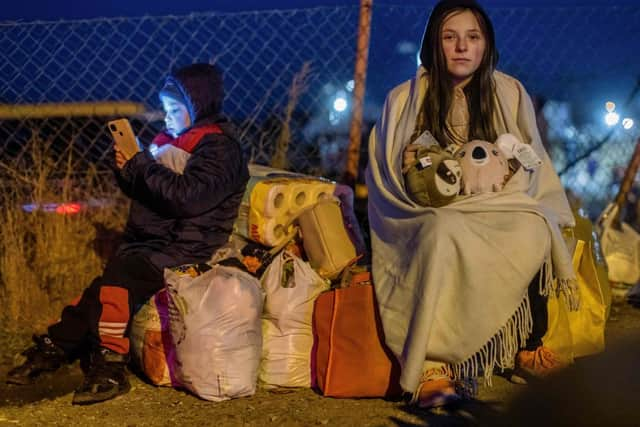

“As you can imagine it’s a bit of a mess at the moment, when everybody is trying to help and there is no organisation it is causing more problems than help,” Mykhailo explained.
Advertisement
Hide AdAdvertisement
Hide Ad“That’s why it’s important for charities here in London to coordinate.
“We have groups and we share with each other what is needed.”
Tetyana Vovnyanko, co-founder of British-Ukrainian Aid, is another Londoner helping her country from the UK.
Like Mykhailo, she also took some time off work when the fighting began.
Advertisement
Hide AdAdvertisement
Hide Ad“When Russia first invaded I took the week off on sick leave because emotionally I was overstretched as the crisis affects us very deeply emotionally,” the 48-year-old university administrator explains.
“I took another week off on holiday leave because helping Ukraine particularly right now requires a lot more time than it did before.
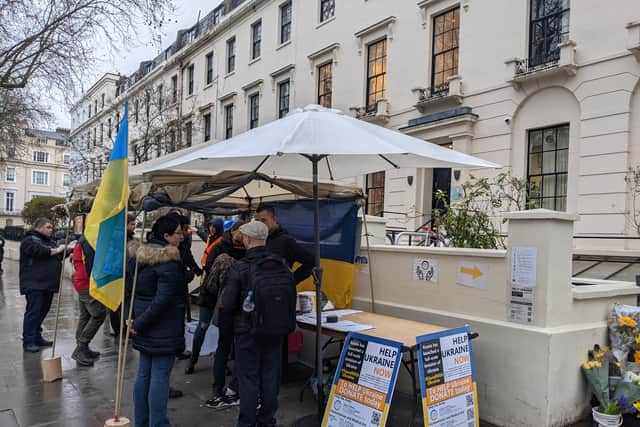

Based in Holland Park, British-Ukrainian Aid focuses on delivering medical aid to the front line.
Stalls have been erected outside the front of the centre, to quickly process donations and organising where to send them.
Advertisement
Hide AdAdvertisement
Hide AdTetyana and her team have been coordinating with the Ukrainian Medical Association and NHS trusts to obtain medical aid and equipment donations.
“We have connections with people on the ground in Ukraine,” Tetyana says.
“It’s more difficult now as cities are under constant artillery strikes and the supply network that we used to have there and the communication with charities on the ground was much easier before.
“Now for instance as Kharkiv is under constant shelling it is difficult to reach out to the NGO which we used to work with a few years ago.
Advertisement
Hide AdAdvertisement
Hide Ad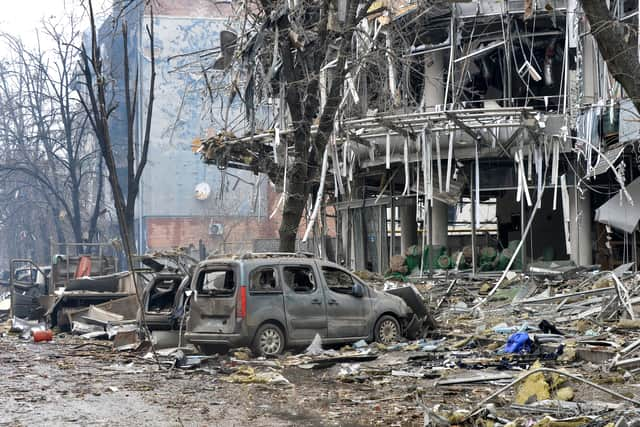

“We receive requests from volunteers working closely with soldiers, with doctors and territorial defence groups and this information comes through to a Ukrainian community centre or to us because our charity focuses on providing medical help.
“We have also started to receive requests from the hospitals and we’re working in cooperation with the Ministry of Health in Ukraine.”
Tetyana assures me that although things may seem hectic here in London, everything is under control.
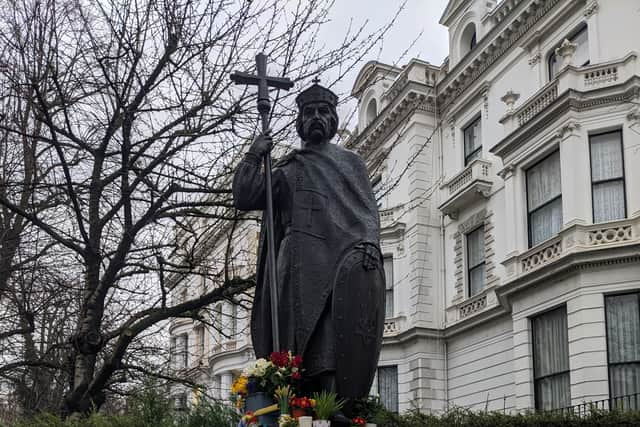

“Within this very active movement with people coming in and out of our centre it could feel disorganised but it’s the same way when you look at ants when moving leaves in the forest, they are extremely organised, we are like the ants,” she explains.
Advertisement
Hide AdAdvertisement
Hide AdTetyana tells me that although they are overwhelmed with donations now she fears people will start to grow tired and lose interest in the plight of Ukrainians.
“For example with Syria and Afghanistan we don’t see it on the news anymore,” she says.
“We fear that people will grow tired of hearing about Ukraine and the level of donations will decrease or even stop.”
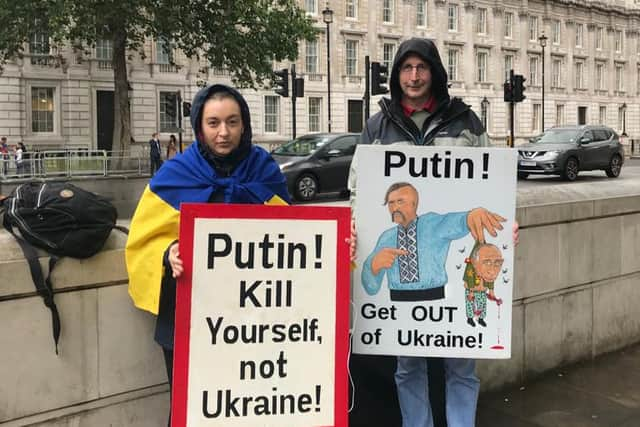

Days before the invasion started I spoke to Tetyana’s colleague Natalia Ravliuk, who co-founded British-Ukrainian Aid with her back in 2014.
Advertisement
Hide AdAdvertisement
Hide AdNatalia, who a source told me “drives the Ukrainian resistance in London”, has been protesting against the Russian occupation of her country for the last eight years.
She even travelled to the frontline during the war in 2014, to deliver supplies and medicine to Ukrainian troops.
“It’s very difficult to describe how I feel, I wouldn’t say it’s fear, we are not scared of him [Putin],” the patriotic 41-year-old tells me.
“I am just so angry that somebody in the 21st century can do whatever he wants to a sovereign country.
Advertisement
Hide AdAdvertisement
Hide Ad“He knows he’s got plenty of armies, he knows he’s powerful, he’s got money, he can do this to anyone.”
Before the Russian invasion there were 19,000 Ukrainian people living in London, with the largest populations in the boroughs of Newham, Ealing, Hounslow and Waltham Forest.
According to Home Office figures released on February 28, 164,500 people arrived to the UK through the Ukraine visa scheme since the war started.
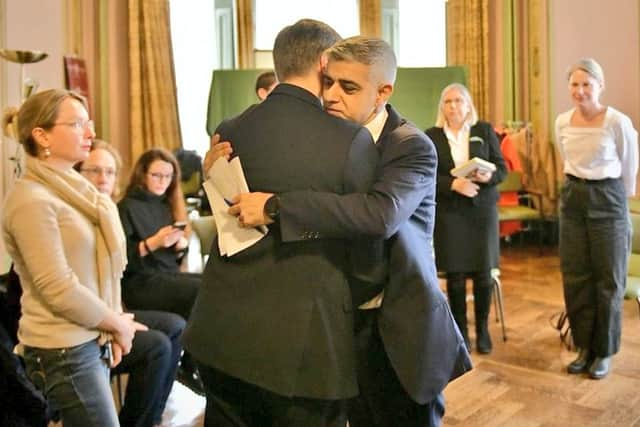

The mayor of London Sadiq Khan has been meeting with Londoners who have links with Ukraine, including the Ukrainian ambassador and the deputy ambassador to find out ways we can help.
Advertisement
Hide AdAdvertisement
Hide Ad“The first thing is, with the best of intentions, it’s really important that we don’t do things that aren’t really helping the people of Ukraine,” he tells me.
“The three things that those in Ukraine need is firstly food, it isn’t food that we send, its food that’s easily usable by them, supplied by humanitarian organisations, secondly is medical supplies and thirdly is defensive equipment.
“The best thing we can do is donate to the experts, those in the Disasters Emergency Committee, who can purchase the correct stuff for the people in Ukraine.”
The mayor says he is supporting those in London gathering medical supplies with warehouse facilities.
Advertisement
Hide AdAdvertisement
Hide AdHe also said he is lobbying the government to make it easier for people from Ukraine to be able to come to the UK and also pressuring the government to move far more quickly in relation to seizing assets from those Russian oligarchs closer to Putin.
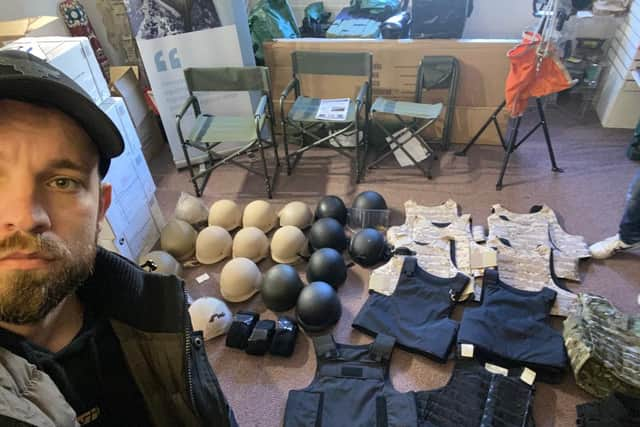

Meanwhile in between responding to urgent messages from the frontline, Mykhailo says that the support from the UK and people all over the world has meant a lot to Ukrainians.
“When you are in Kyiv and turn on the television and see half a million people protesting in other countries it helps a lot,” he says.
President Zelensky has called for foreigners to help Ukrainians fight to defend their country.
It is not known how many people have answered his call.
Advertisement
Hide AdAdvertisement
Hide AdYou can help support Mykhailo’s work by donating to his fund. Details are Sich LTD, Sort Code: 20-32-00, Account 50769304.
You can support and learn more about British-Ukrainian Aid by visiting their website.
To stay informed on what is happening within the Ukrainian community you can follow Ukrainian Events in London’s Facebook page.
A message from the editor:
- Thank you for reading our coverage of Russia’s invasion of Ukraine, which is having far-reaching consequences for everyone across London, including our Ukrainian neighbours. You can find more stories on Londoners caught up in the conflict here.
- If you would like to help, we have compiled a guide which includes the latest donation points in London, details on protests and also the best charities to donate to.
- For the more news, analysis and information on the conflict, visit our sister site NationalWorld.
Comment Guidelines
National World encourages reader discussion on our stories. User feedback, insights and back-and-forth exchanges add a rich layer of context to reporting. Please review our Community Guidelines before commenting.
